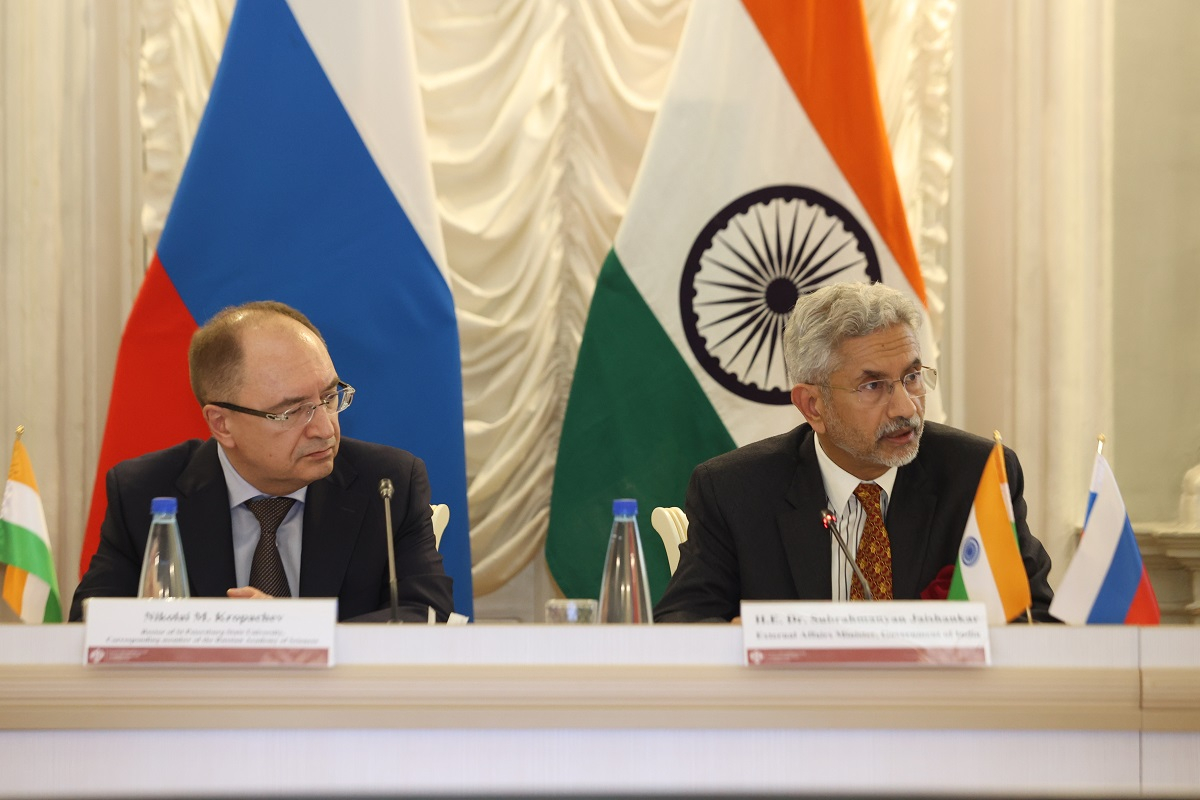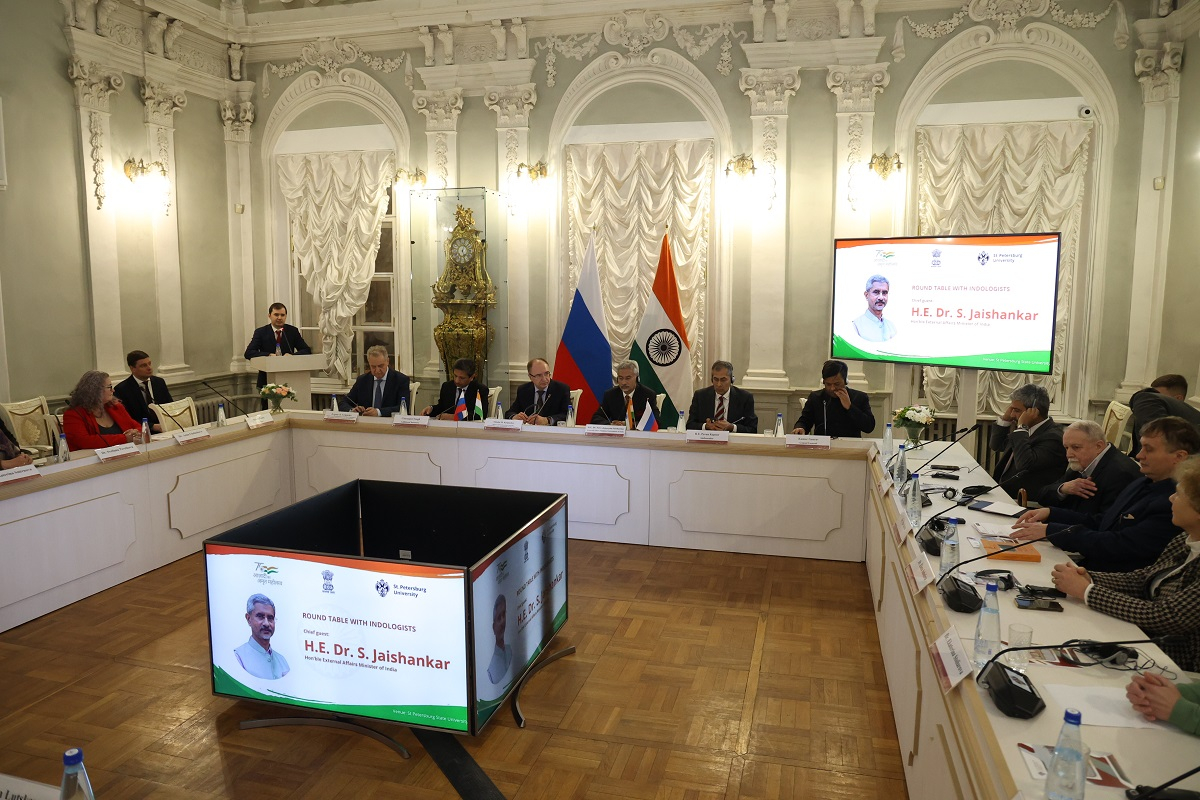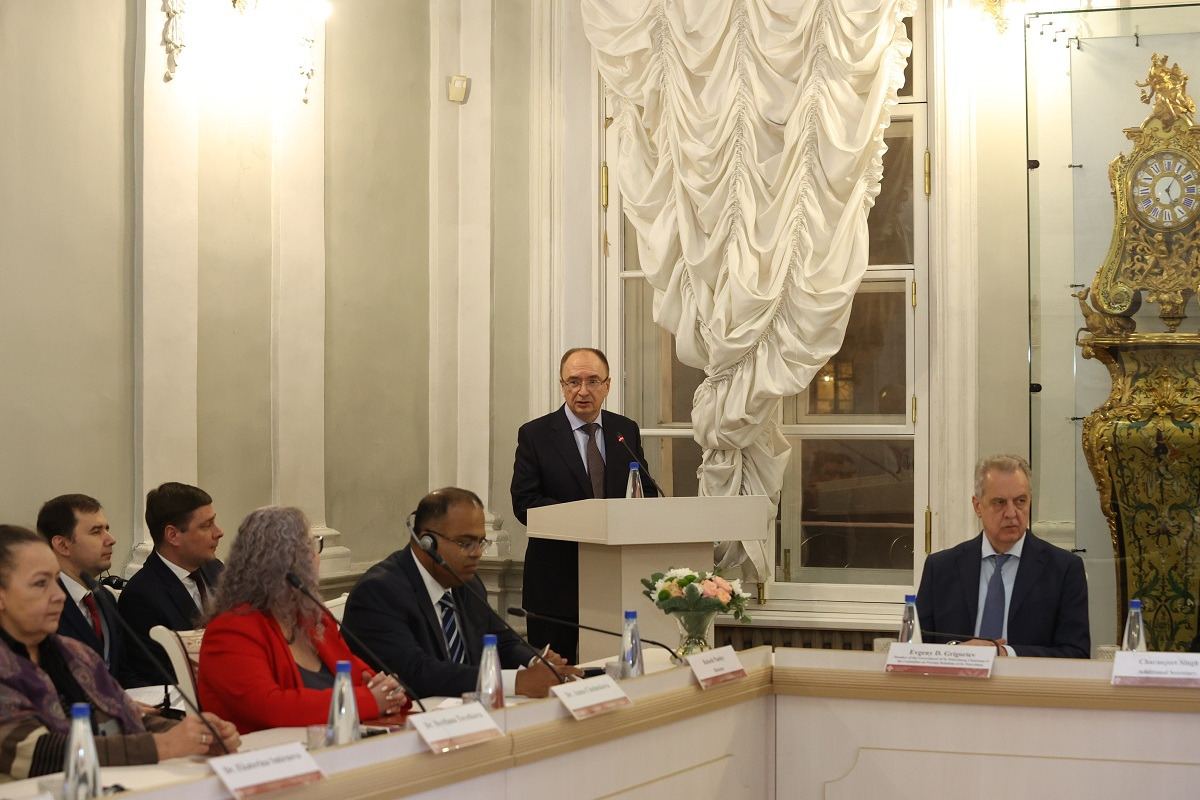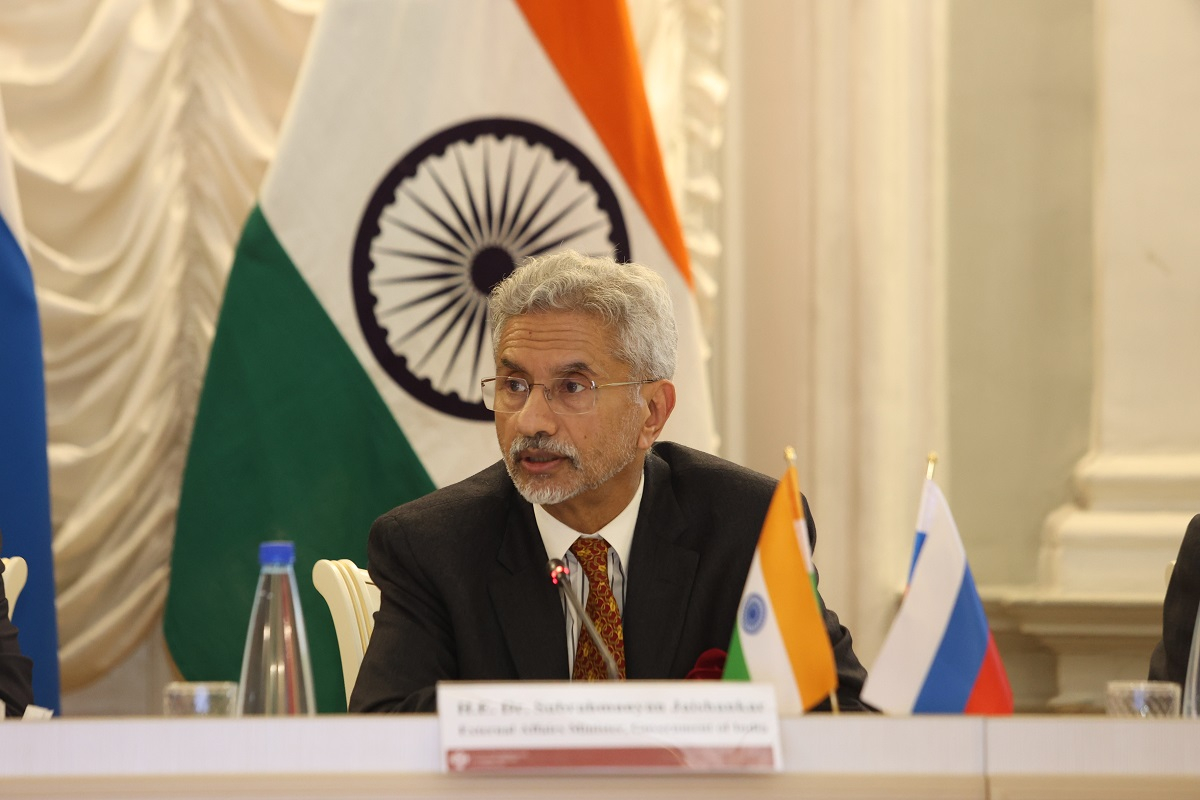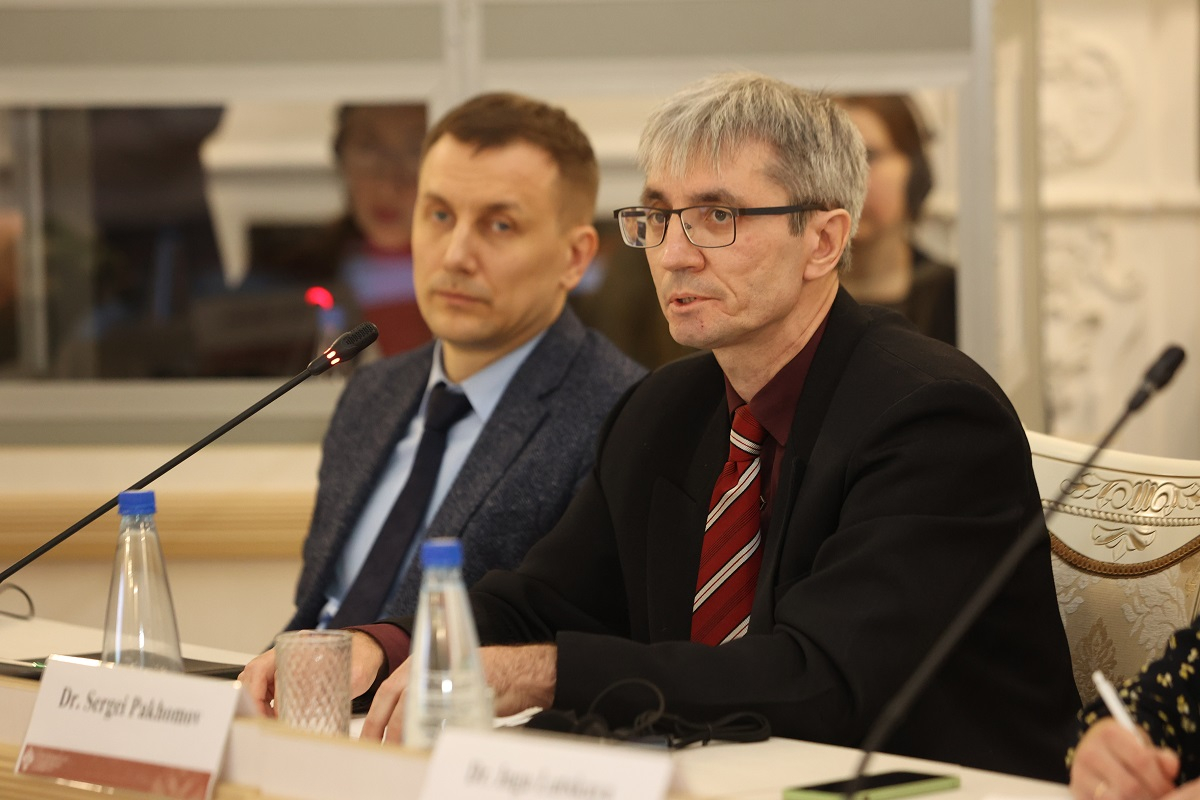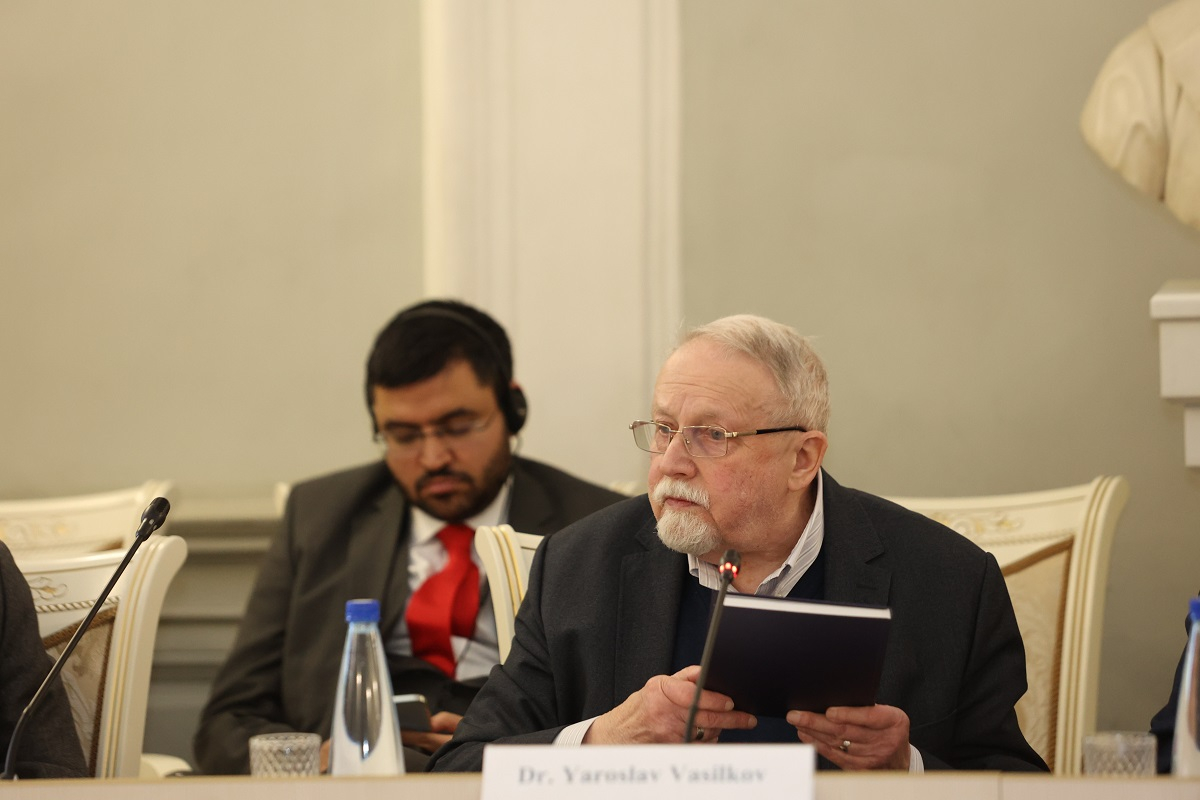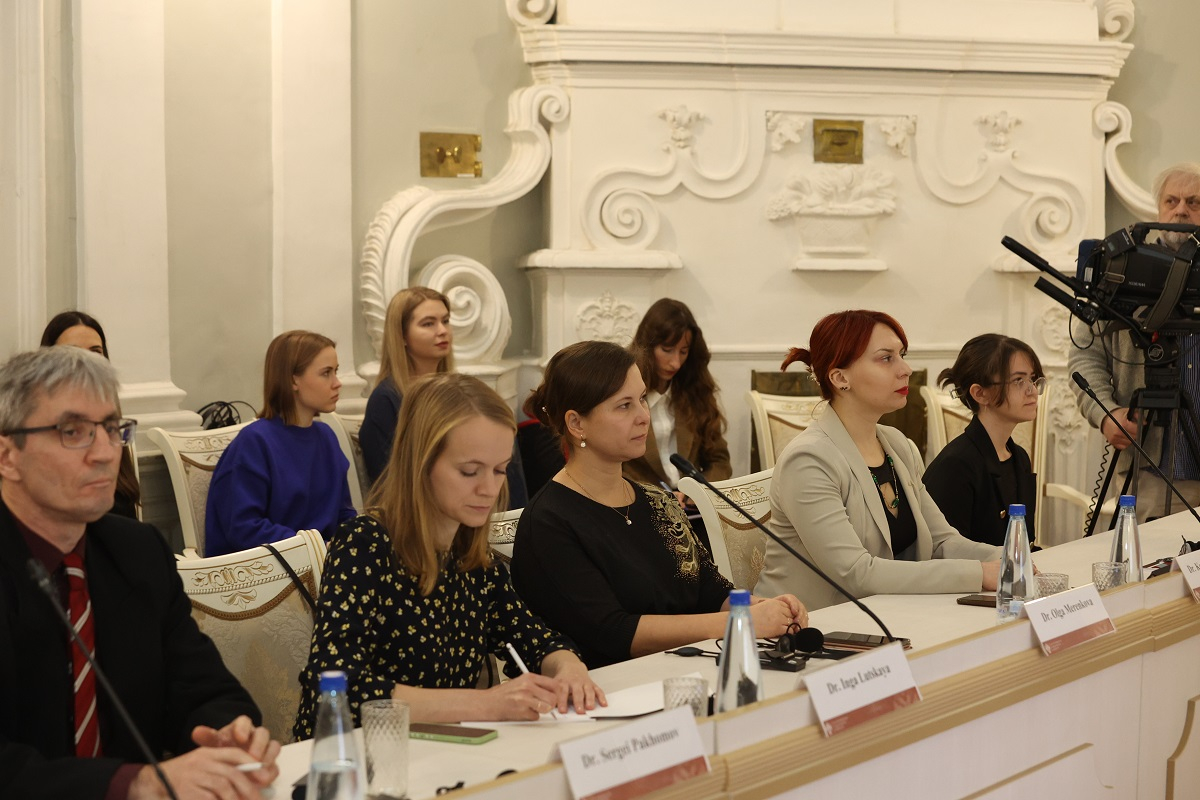The Minister of External Affairs of India visits St Petersburg University
St Petersburg University has been visited by Dr Subrahmanyam Jaishankar, Minister of External Affairs of India. As part of his visit to the alma mater of the President of the Russian Federation Vladimir Putin, Dr S Jaishankar attended a meeting with leading Indologists in St Petersburg and heard their proposals for the development of Russian-Indian cooperation. The Indian delegation also included the Ambassador of the Republic of India Mr Pavan Kapoor and the Consul General of the Republic of India in St Petersburg Mr Kumar Gaurav.
Opening the meeting, Dr S Jaishankar said that he was happy to be in St Petersburg, which is a special city for him. It is the city where the pioneer of Russian Indology Gerasim Lebedev and other prominent Russian Indologists, including Ivan Minayev and Fyodor Shcherbatskoy, lived. Dr S Jaishankar shared that he was impressed when he learnt about the branches of Indology studied at the University. He emphasised that the decades of successful cooperation between Russian and Indian scholars have generated amazing results.
During his five-day visit to Russia, Minister of External Affairs of India Dr Subrahmanyam Jaishankar met with President of Russia Vladimir Putin and Foreign Minister Sergey Lavrov.
‘Generating an interest in our culture is of real significance today, when our countries are trying to renew ties, find common ground and take a fresh look at our relationship. And of course, intellectual elites can play an important role in these processes,’ said Dr S Jaishankar. ‘Given the current political environment, it is critical that we communicate without intermediaries and that other nations have no impact on our perception of each other. This is a direct investment in understanding partner nations, which is vital today.’
On behalf of my country, I would like to thank you all for your contributions to the development of relations between our countries.
Dr Subrahmanyam Jaishankar, Minister of External Affairs of the Republic of India
According to Minister of External Affairs of India Dr S Jaishankar, in the current international climate, with regard to building a multi-polar world, countries need to develop their own traditions, taking into account the interests and points of view of their international partners. Honouring different cultural perspectives will promote diversity and democracy in the world. ‘I am confident that in the next quarter of the century India will be able to succeed in becoming a developed country. This applies not only to the economy since a developed country is a sovereign state that values its culture and safeguards its cultural heritage,’ Dr S Jaishankar emphasised. ‘We often talk about economic development; yet, it is no less important that we honour and uphold traditions not only within our own country. We should also make efforts to garner respect for our traditions in other countries. This can be achieved through cooperation of Indologists across the globe.’
Professor Nikolay Kropachev, Rector of St Petersburg University and Corresponding Member of the Russian Academy of Sciences, welcomed the distinguished guests to the oldest university in Russia, which will celebrate its 300th anniversary on 8 February 2024. Professor Kropachev stressed that today St Petersburg University is one of the world’s leading academic centres, which, along with Moscow State University, is granted a special status in Russia. Nine Nobel Prize laureates studied, worked or taught at St Petersburg University. Among its alumni are Fields Prize winners Stanislav Smirnov and Grigori Perelman, as well as President of Russia Vladimir Putin.
St Petersburg University is renowned for its reputation in Oriental Studies. Hence, it is only natural that the University hosts a meeting of leading Indologists, with the participation of our honoured guest — Minister of External Affairs of India Dr Subrahmanyam Jaishankar.
Professor Nikolay Kropachev, Rector of St Petersburg University
‘The history of Indology in St Petersburg dates back to 1836, when Professor Robert Lenz from the Asiatic Museum (now the Institute of Oriental Manuscripts of the Russian Academy of Sciences) was invited to teach Sanskrit and comparative linguistics at St Petersburg Imperial University. In 1858, the Faculty of Oriental Languages was founded and the Department of Sanskrit and Persian Philology was opened at the University,’ Nikolay Kropachev noted.
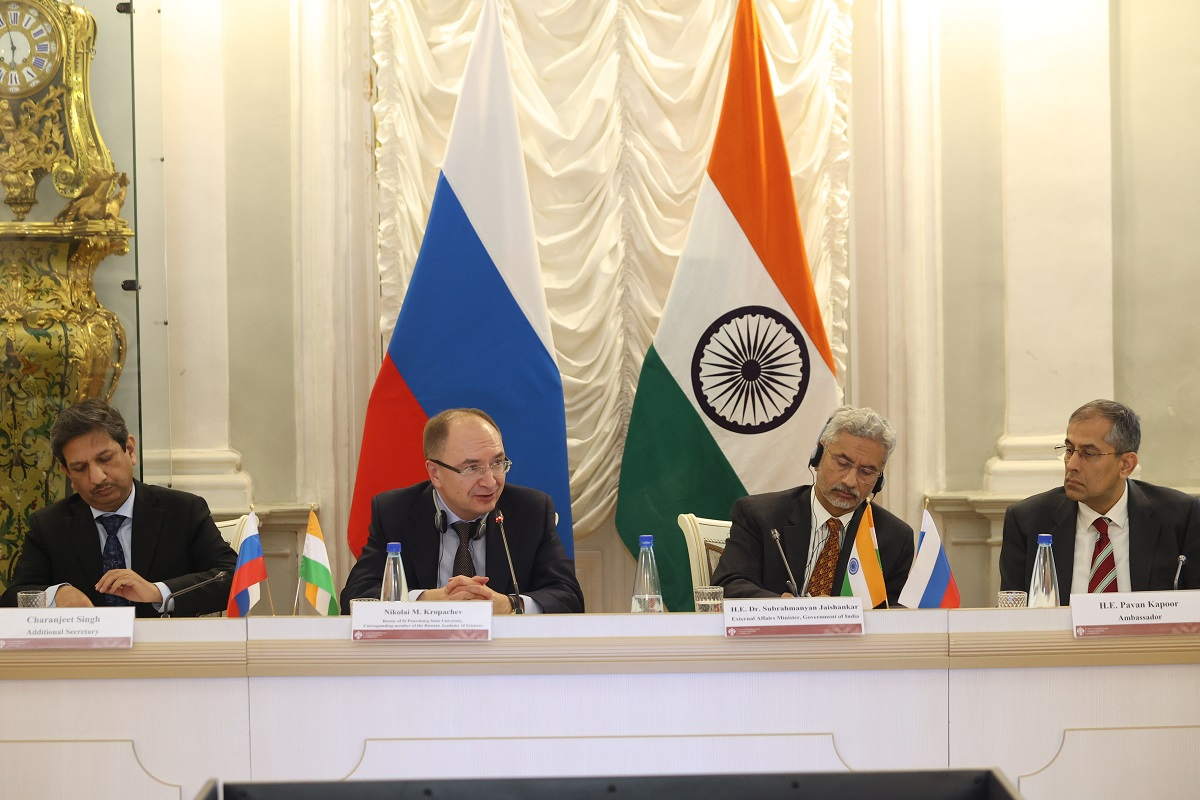
Professor Kropachev noted that St Petersburg University has developed a special school of Sanskrit studies based on a combination of traditional Indian and European scientific methods. Today, the Department of Indian Philology at St Petersburg University teaches seven languages of India, including Telugu. In fact, St Petersburg University is one of the three European universities where you can study Telugu. Furthermore, there are plans to start teaching Malayalam in the near future and launch an online course of Hindi for beginners. Currently, St Petersburg University offers 25 academic programmes with an Indian component.
During the meeting, Professor Nikolay Kropachev outlined a number of key proposals for the development of Russian-Indian partnership in education. He proposed to open an academic programme dedicated to the organisation of tourism activities with the opportunity to study Hindi; develop cooperation with Indian online learning platforms; and jointly create online courses on the history, culture and art of India and Russia. Professor Kropachev also suggested concluding a direct cooperation agreement between St Petersburg University and the Ministry of Education of the Republic of India and considering the possibility of establishing a representative office or a branch of St Petersburg University in India.
Professor Anna Chelnokova, Head of the Department of Indian Philology at St Petersburg University and Chairperson of the Society for Cultural Relations with India, talked about the activities of St Petersburg University’s Indologists. ‘A characteristic feature of Indian culture is that it has preserved its ancient traditions and is always eager to move forward. Similarly, the traditions of Russian Indology School have been recognised since the 19th century not only for its Sanskrit Studies but also for the study of modern Indo-Aryan and Dravidian languages,’ said Professor Chelnokova. ‘Today, Russian readers are well aware of the translations of literary works by famous Indian Hindi authors and medieval Indian poets and writers, such as Surdas and Kalidasa. One of India’s most famous literary treasures, the poem Ramacharitamanas, was translated in Leningrad by Academician Aleksei Barannikov, Head of the Department of Indian Philology at Leningrad State University. I am very pleased that the study and teaching of Hindi in Russia has such a long history. Indologists from St Petersburg University and Moscow State University do their best to maintain the traditions of translations of Hindi literature.’
Professor Anna Chelnokova made some proposals for the development of Indology at St Petersburg University, focusing on: student language practice programmes; maintaining the tradition of translating literary works from Indian languages into Russian; and popularising Indian culture in Russia.
Proposals for the development of intensified Russian-Indian academic relations were made by leading Indologists of St Petersburg: Igor Kotin, Head of the Department of South and South West Asia at the Peter the Great Museum of Anthropology and Ethnography of the Russian Academy of Sciences (Kunstkamera); Yaroslav Vassilkov, Senior Research Fellow at the Peter the Great Museum of Anthropology and Ethnography of the Russian Academy of Sciences; Sergey Pakhomov, Associate Professor in the Department of Philosophical Anthropology and History of Philosophy at the Institute of Philosophy of Man at Herzen University; Ekaterina Stoliarova, Researcher at the State Museum of the History of Religion; and Ekaterina Ezugbaia, Project Coordinator in the Department for Chinese, South and Southeast Asian Studies at HSE University.


